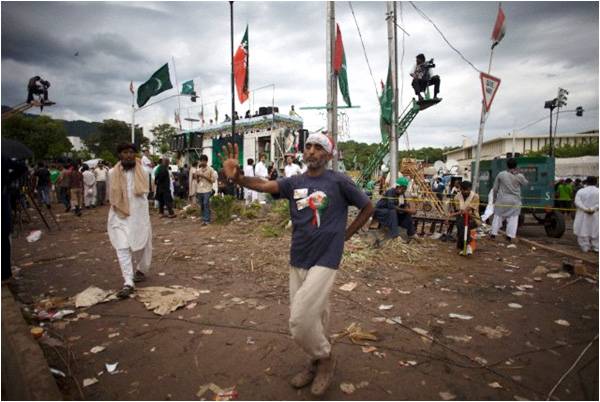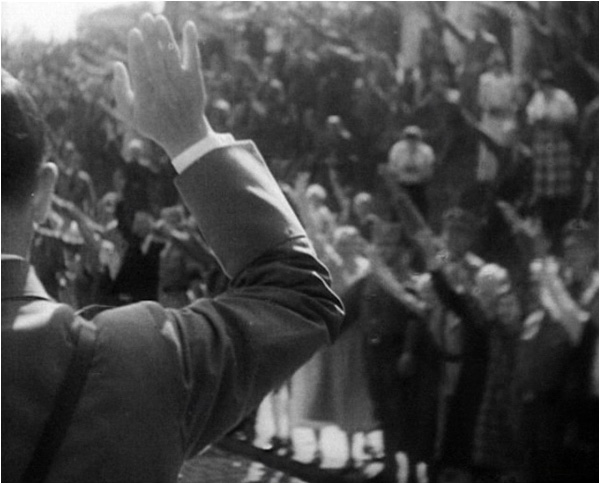
“The business of art is no longer the communication of thoughts or feelings which are to be conceptually ordered, but a direct participation in an experience. The whole tendency of modern communication...is towards participation in a process, rather than apprehension of concepts.”
– Marshall McLuhan
There is a theatre season going on in Pakistan – a political theatre season. And it is playing, as they say, to packed houses. The major production of course is that of Imran Khan’s PTI. Taking off from the three-month-plus twin Dharnas in Islamabad, Kaptan Khan addressed impressively large rallies in Karachi, Lahore, Mianwali, Multan, Rahimyar Khan, Sahiwal, DG Khan, Larkana, and Gujranwala. His Jamaat-e-Islami coalition partners have just concluded a huge three-day Ijtima in Lahore. Not to be left behind, the PML-Q of the Chaudhry brothers held a Jalsa at Bahawalpur. And even the geriatric PPP lumbered upright long enough to mount a massive show in Karachi, where the Arrow song (circa 1986) provided the musical backdrop, and the presence of the young Bilawal brought the average age of those lolling on the huge stage down to just under seventy.
It is not just that these Dharnas and Jalsas have drawn crowds everywhere. They are also avidly watched on television, in every home in this sad, violent and beautiful land of ours. Political theatre is, at bottom, a season of media circus – one where even Sheikh Rashid has a major role.
Now, as the quotation from McLuhan in the epigraph may have alerted my readers, it is the media that my submission today concerns. The audio-visual forerunner of television was the cinema. And, in its time, cinema was used, not just as entertainment, but also as a vehicle for propagating political ideas.
Leni Riefenstahl, the great German film director, was regarded as a cinematic genius, although always controversial because of her once-close relationship with Hitler and the Nazi Party. This remarkable lady, whose earlier ideological orientation we must overlook, died at the age of 101 not many years ago. Right up to the age of 90, she had remained creatively active, writing books and taking photographs while trekking in the wilds of Africa and scuba-diving in the Indian Ocean. In her 100th year, she went on a walking tour in the Bavarian Alps. She threw a huge party for her 101st birthday, at which she even managed to dance (a bit) and drink champagne (a lot).
Riefenstahl made two especially famous propaganda films for the Nazi Party and its Fuhrer: Triumph of the Will (1934) and Olympia (1936). This latter work is a documentary of the 1936 Olympic games, held in Berlin, and it quite remarkably uses visual imagery to transform the games into a paean of triumph for the dictator, his brutal party, and the vile and violent ideology of Nazism. Riefenstahl brilliantly utilised the then still young medium of the cinema to create outstanding political theatre.
It was not the first time the cinema had been used for propagandising a political ideology. The American DW Griffith had extolled white racism in his Birth of a Nation in 1915. The Russian genius Sergei Eisenstein (who, it is said, “could get a crowd to perform like other directors use individual actors”) had made such films as Battleship Potemkin and October: 10 days that shook the world to celebrate the 1917 Bolshevik Revolution.
Today, the cinema medium has been succeeded by the far more powerful and ubiquitous medium of television, which beams commercial and ideological messages into the depths of every home.
The Canadian thinker Marshal McLuhan wrote:
“The TV camera has no shutter. It does not deal with aspects or facets of objects in high resolution. It is a means of direct pick-up.”
It is this immediacy of the television medium and its lack of subtlety, layering and nuance that are to the point here. If you want fine reasoning and intelligent analyses, you should read the printed word (for example, this piece). If you wish the sensation of living directly within an event, of “participation in process rather than apprehension of concept,” turn on your TV.
"The young today cannot follow narrative but they are alert to drama"
McLuhan, who lived in the days of the so-called Youth Revolution of the 1960s, also suggested that: “The young today cannot follow narrative but they are alert to drama.”
Or, to quote from a satirical poem sent as a letter to this publication by a Mr Nooruddin Ahmed of Aylesbury, UK:
“I say stupid things coz’ I speak off the cuff,
So don’t you take seriously my idiotic guff.
My Youthias like me, love it crude and rough.
So why bother doing any complex stuff?”
A word about the “Youthias” is in order before I move on. Some pundits consider that these youth of the nation, the ‘Facebook generation’, are about to mount a revolution. Hogwash! While implying no aspersions on their sincerity, the fact is that most of the young people one observes at these jalsas, or who troll the (English language) Net in order to verbally pounce on any anti-IK remarks, are clearly those whom the awam labels as “burgers”: the pampered progeny of the elite, scarcely representative of our white-collar wage-slaves or downtrodden poor. You will more likely find the real youth of this nation at MQM jalsas or a Jamaat-e-Islami Ijtima...or at clandestine meetings of Daish sleeper cells. Let’s face it. The story of Pakistan’s youth is a tragic one. Educated (if at all) under the toxic post-Zia syllabi, brains stuffed with misinformation and jingoistic fantasies, unemployed for the most part and, quite often, largely unemployable, they may well be a lost generation. The mainstream political entities, which certainly include the PTI, are all parties of the super-privileged elderly, which have no nexus with the young. These angry, bitter and confused youths could soon start awakening from their sullen alienation to cast about for a new leader, one who speaks their harsh, nihilistic language.

'Go-Nawaz-Go' is scarcely a political programme
To return to my theme, the political theatre of today is cheap, entertaining, and engages the audiences and the viewers, because it is simplistic, repetitious and intellectually crude. That’s why the TV media moguls give it the immense airtime they do. As for the audiences, when there’s so much wrong with a society, and so little competence demonstrated by any government, civil or military, then it is easy for wannabe power-seekers to press on all our terribly raw nerves without offering any positive alternative. “Go-Nawaz-Go” is scarcely a political programme.
History tells us of other politicos in other lands who rhetorically attacked everything around them. Consider, for example, Leni Riefenstahl’s former Fuhrer. Consider, also, how exultant his notorious propaganda chief Dr Joseph Goebbels would have been had he seen how his ideas are being actualised. In Pakistan. Today.

